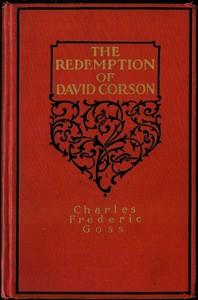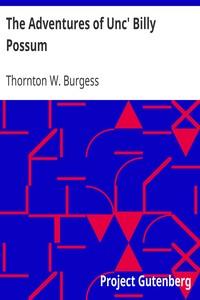|
|
Read this ebook for free! No credit card needed, absolutely nothing to pay.Words: 104214 in 48 pages
This is an ebook sharing website. You can read the uploaded ebooks for free here. No credit cards needed, nothing to pay. If you want to own a digital copy of the ebook, or want to read offline with your favorite ebook-reader, then you can choose to buy and download the ebook.

: The Redemption of David Corson by Goss Charles Frederic - Society of Friends Fiction Bestsellers American 1895-1923@FreeBooksTue 06 Jun, 2023 THIS OTHER EDEN Hidden away in this worn and care-encumbered world, scarred with its frequent traces of a primeval curse, are spots so quiet and beautiful as to make the fall of man seem incredible, and awaken in the breast of the weary traveler who comes suddenly upon them, a vague and dear delusion that he has stumbled into Paradise. Such an Eden existed in the extreme western part of Ohio in the spring of eighteen hundred and forty-nine. It was a valley surrounded by wooded hills and threaded by a noisy brook which hastily made its way, as if upon some errand of immense importance, down to the big Miami not many miles distant. A road cut through a vast and solemn forest led into the valley, and entering as if by a corridor and through the open portal of a temple, the traveler saw a white farm-house nestling beneath a mighty hackberry tree whose wide-reaching arms sheltered it from summer sun and winter wind. A deep, wide lawn of bluegrass lay in front, and a garden of flowers, fragrant and brilliant, on its southern side. Stretching away into the background was the farm newly carved out of the wilderness, but already in a high state of cultivation. All those influences which stir the deepest emotion of the heart were silently operating here--quiet, order, beauty, power, life. It affected one to enter it unprepared in much the same way, only with a greater variety and richness of emotion, as to push through dense brush and suddenly behold a mountain lake upon whose bosom there is not so much as a ripple, and in whose silver mirror surrounding forests, flying water-fowl and the bright disk of the sun are perfectly reflected. "Thee will have to go and call him, Stephen, for I think he has fallen into another trance," the woman said, in a low voice in which there was not a trace of impatience, although the evening meal was waiting and the pressing work of the household had been long delayed. The child threw down his dinner horn, whistled to his dog and started. Springing up from where he had been watching every expression of his master's face, the shaggy collie bounded around him as he moved across the lawn, while the woman watched them with a proud and happy smile. They had scarcely entered the long lane leading to the pasture, when a woodchuck shambled out of the corner of the fence and ran lumbering into his burrow. Rushing excitedly after him the child clapped his hands and shouted: "Dig him out! Dig him out, Shep!" Tearing up the ground with his paws and thrusting his head down into the subterranean chamber, the obedient collie yelped and whined. Then backing out and plunging in once more, he yelped and whined again. The hole was too deep or the time too short and the boy became discouraged. Moving reluctantly away he chidingly summoned his companion to follow him. The dog, humiliated by his failure, obeyed, and sheepishly licked his mouth with his long, red tongue. Unutterable and incomprehensible emotions were awakened in the soul of the boy by the stillness and beauty of the evening world. His senses were not yet dulled nor his feelings jaded. Through every avenue of his intelligence the mystery of the universe stole into his sensitive spirit. If a breeze blew across the meadow he turned his cheek to its kiss; if the odor of spearmint from the brookside was wafted around him he breathed it into his nostrils with delight. He saw the shadow of a crow flying across the field and stopped to look up and listen for the swish of her wings and her loud, hoarse caw as she made her way to the nesting grounds; then he gazed beyond her, into the fathomless depths of the blue sky, and his soul was stirred with an indescribable awe. Everything filled him with surprise, with wonder and with ecstasy,--the glowing sky above the western hills, the new pale crescent of the silver moon, the heavy-laden honey bees eagerly hastening home, the long shadows lying across his path, the trees with branches swaying in the evening breeze, the cows with bursting udders lowing at the bars. But it was not so much the objects themselves as the spirit pervading them, which stirred the depths of the child's mind. The little pantheist saw God everywhere. We bestow the gift of language upon a child, but the feelings which that language serves only to interpret and express exist and glow within him even if he be dumb. And this gift of language is often of questionable value, and had been so with him. Things he had heard said about God often made the boy hate Him. All that he felt, filled him with love. To him the valley was heaven, and through it invisibly but unmistakably God walked, morning, noon and evening. To the child sauntering dreamily and wistfully along, the object dimly seen from the farm-house door began gradually to dissolve itself into a group of living beings. Two horses were attached to a plow; one standing in the lush grass of the meadow, and the other in a deep furrow traced across its surface. The first, an old gray mare, was breathing heavily, her sides expanding and contracting like a bellows. Her wide nostrils opened and closed with spasmodic motions. Her eyes were shut and she seemed to be asleep. The other, a young and slender filly doing this season the first real service of her life, pawed the ground restlessly, snorted, shook her mane, rattled the harness chains and looked angrily over her shoulder at the driver. The plowshare was buried deep in the rich, alluvial soil, and a ribbon of earth rolled from its blade like a petrified sea billow, crested with a cluster of daisies white as the foam of a wave. Between the handles of the plow and leaning on the crossbar, his back to the horses, stood a young Quaker. His broad-brimmed hat, set carelessly on the back of his head, disclosed a wide, high forehead; his flannel shirt, open at the throat, exposed a strong, columnar neck, and a deep, broad chest; his sunburned and muscular arms were folded across his breast; figure and posture revealed the perfect concord of body and soul with the beauty of the world; his great blue eyes were fixed upon the notch in the hills where the sun had just disappeared; he gazed without seeing and felt without thinking. The boy approached this statuesque figure with a stealthy tread, and plucking a long spear of grass tickled the bronzed neck. The hand of the plowman moved automatically upward as if to brush away a fly, and at this unconscious action the child, seized by a convulsion of laughter and fearing lest it explode, stuffed his fists into his mouth. In the opinion of this irreverent young skeptic his Uncle Dave was in a "tantrum" instead of a "trance," and he thought such a disease demanded heroic treatment. For several years this Quaker youth had been the subject of remarkable emotional experiences, in explanation of which the rude wits of the village declared that he had been moon-struck; the young girls who adored his beauty thought he was in love, and the venerable fathers and mothers of this religious community believed that in him the scriptural prophecy, "Your young men shall see visions," had been literally fulfilled. David Corson himself accepted the last explanation with unquestioning faith. He no more doubted the existence of a spiritual than of a material universe. He did not even conceive of their having well-defined boundaries, but seemed to himself to pass from one to the other as easily as across the lines of adjoining farms. In this respect he resembled many a normal youth, except that this impression had lingered with him a little longer than was usual; for faith is always instinctive, while skepticism is the result of experience and reflection. Having as yet only wandered around the edges of the sacred groves of wisdom where these pitiless teachers break the sweet shackles of their pupils, he still thought the thoughts of childhood and instinctively obeyed the injunction of Emerson, to "reverence the dreams of our youth," and the admonition of Richter, that "when we cease to do so, then dies the man in us." Whatever might have been the real nature of these emotional experiences, no one doubted that they possessed a genuine reality of some kind or other, for it was a matter of history in this little community that David Corson had often exercised prophetic, mesmeric and therapeutic powers. The life of this young man had been pure and uneventful. Existence in this frontier region, once full of the tragedy of Indian warfare, had been gradually softened by peace and religion. The passions slowly kindling in the struggle over slavery had not yet burst into flame, and this particular valley was even more quiet than others because it had been settled by a colony of Quakers. Into it the rude noises of the great outside world floated only in softened echoes, and what knowledge young Corson had acquired of that vague and shadowy realm had come mainly through traveling preachers, and this, because of their simplicity and unworldliness, was not unlike hearing the crash of arms through silken portieres or seeing the flash of lightning through the stained-glass windows of a cathedral. In such a sequestered region books and papers were scarce, and he had access only to a few volumes written by quietists and mystics, and to that great mine of sacred literature, the Holy Bible. The seeds of knowledge sown by these books in the rich soil of this young heart were fertilized by the society of noble men, virtuous women, and natural surroundings of exquisite beauty. Free books android app tbrJar TBR JAR Read Free books online gutenberg More posts by @FreeBooks
: Half Portions by Ferber Edna - United States Social life and customs 20th century Fiction@FreeBooksTue 06 Jun, 2023

: Noël dans les pays étrangers by Chabot Alphonse - Christmas Christmas; FR Peuples et Sociétés@FreeBooksTue 06 Jun, 2023
|
Terms of Use Stock Market News! © gutenberg.org.in2025 All Rights reserved.






